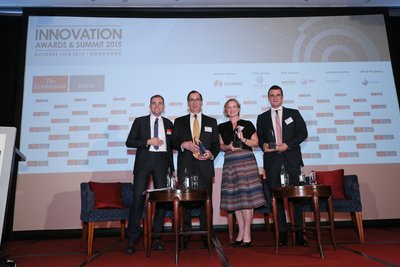HONG KONG, Oct. 16, 2015 /PRNewswire/ -- Winners of The Economist's prestigious Innovation Awards 2015 spoke at The Economist Events' Innovation Summit, sharing their experiences and the lessons those hold for others. The summit convened more than 180 innovators and business leaders to discuss how they create value within existing business models.

"Unlike other awards ceremonies and conferences, our focus is not simply on promising innovations that might turn out to be important," said Tom Standage, deputy editor of The Economist. "Rather, our focus was on proven innovations that have demonstrated their value -- and the lessons that can be learned from them. In other words, we look backwards in order to look ahead."
Key take-away includes:
At this year's event, The Economist gave innovation a reality check. As a foil to the idealism of Silicon Valley start-up and venture-capital cultures, the discussions focused on the challenges of innovating inside Asia's established businesses, robots and the future of work, how corporate giants innovate to grow, and even the future of travel to Mars.
John Rice, vice-chairman at General Electric, on discussing the challenges of building innovation into large companies, stated: "The question is who makes time for innovation? Our leaders need to carve out the time to do, practice and cultivate innovation."
Armand Zand, founding partner, Red Lion Capital, on entrepreurship and disruption, said, "I like to ask entrepreneurs what their vision is of their industry. Many new CEOs have never thought about this. If you don't know where your industry is going in 5-7 years, chances are you will always be playing from behind."
A lively debate between Steve Monaghan, regional director and head of edge (group innovation), AIA, and Cheryl Yeoh, chief executive officer, Malaysia Global Innovation & Creativity Centre, saw the two lock horns over whether Asia's established firms are also its most innovative. Steve Monaghan increased his share of the audience vote and took the victory. He said, "Start-ups focus on very small technology sectors in a big market, but large companies' capital enables these ideas to mature."
At the awards winners panel, Michael J. Sofia, chief scientific officer, Arbutus Biopharma, who was awarded the Bioscience Award for developing a rapid cure for hepatitis C said, "There are 180 million people worldwide who have this disease, so there was an opportunity for an innovative solution. And I chose to found a start-up, Arbutus Biopharma, because in this environment you have the chance to pursue ideas if you believe in them." Sam Gellman, North Asia general manager, Uber, commented, "We observe ourselves as a technology company, and that's how we are able to challenge the status quo." Travis Kalanick, chief executive officer, and Garrett Camp, chairman, co-founders of Uber shared the award for Process and Service Innovation, for app-based ride-hailing.
Huawei, Shenzhen Fountain, Accenture, AIA and Guanghua-Kellogg Executive MBA Program are sponsors of The Economist's Innovation Awards & Summit 2015. DoubleDutch is the official app provider and Edelman is the PR agency.
For further information on the Innovation Awards & Summit 2015, please visit the website: innovation2015.economist.com
About The Economist Events
The Economist Events is one of the world's leading executive event providers. Its events are for intellectually curious individuals who enjoy new ideas and are passionate about the issues that define our world. Whether it's a summit, industry forum or gala dinner, these high-level gatherings bring The Economist to life and provide the ideal setting for interactive, open and informed debate with a uniquely global perspective. Senior executives value these events as important forums in which to exchange views and network with their peers. Visit http://www.economist.com/events-conferences/asia.
Photo - http://photos.prnasia.com/prnh/20151016/8521506890